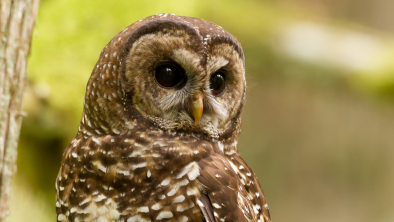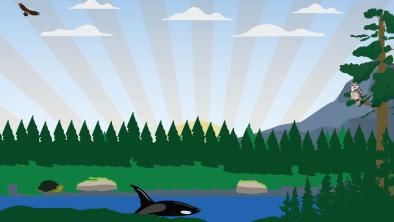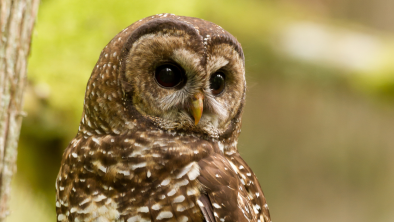Documentary filmed in Chilliwack nominated in the ‘Wildlife Oscars’
Chilliwack Progress

Toad People is the only Canadian film to be nominated in this year’s Panda Wilderness Awards.
It’s not easy being a toad, especially a western toad in southwestern B.C.
Starting life in warm, shallow waters as a tadpole with hundreds or thousands of others in early spring, life can be precarious for the small amphibians, as they do their best to survive. Eventually transforming into fingernail-sized toadlets by the dawning of summer, the western toads then make their way from the wetlands of their birth to the terrestrial lands where they’ll spend the majority of their lives.
However, only measuring a few centimeters in length, a toadlet’s journey from breeding grounds to living space is a highly dangerous one as they often need to cross roadways.
“I like seeing the little baby toadlets,” said seven-year-old Arli Clegg, “And it was sad to see the ones that got smushed by the cars.”
The oldest daughter of Steve Clegg, a well-known, grassroots conservationist in the Chilliwack area, has been hiking the land around her Ryder Lake home with her dad since before she can remember.
“It’s something Arli and I did every day,” explains her dad, Steve. “We’d go into the woods, go into the creek, check on the fish. It’s our daily life and (our kids) just happened to be there with us.”
And in 2013, a camera crew was added to the family hikes into the wilderness in their own backyard.
While in Chilliwack working on another project several years ago, filmmaker Isabelle Groc says she and partner Mike McKinlay heard of the incredible effort being made locally to save the plight of the western toad.
“Starting in 2013, (we) followed the migration in Ryder Lake several times,” said Groc. “We were inspired by these people doing the work in their community.”
After several years of filming in Chilliwack, and across the province, Groc says she and McKinlay were finally able to edit their footage into the documentary film, Toad People.
“The reason why it’s called Toad People is because of the connection between people and species at risk,” Groc continued.
“We (witnessed) this big community saving toads all connected to each other through their love and care and commitment to save the species.”
Produced by the Wilderness Committee, Toad People not only tells the story of the western toad, but of any wildlife species that people across B.C. are attempting to save: be it amphibians, mountain caribou, rattlesnakes, or barn owls.
Even though British Columbia is home to some of the most diverse animal life in North America, including almost 2,000 at-risk species, says Groc, it’s one of only two Canadian provinces with no endangered species law.
The idea behind the film was to “really showcase the fact that … you don’t have to be a PhD or scientist (to make a difference), you just have to be somebody who cares to do something about species at risk: that any step, no matter how small, makes a difference and can be a life-changing experience (for all involved.
And an international audience agrees.
The film was recently honoured with a nomination in the Impact category at the Wildscreen Panda Awards, which have been dubbed the ‘Wildlife Oscars.’
The only fully Canadian film nominated this year, the Awards are part of the world’s biggest festival of natural history storytelling and receive hundreds of submissions annually.
“The Impact category is for films that (they believe) can make an impact through visual storytelling,” explained Groc, who wrote and co-directed the film.
However, with so many powerful submissions this year, the Panda Awards divided the Impact category into two sub-sections, and doubled the amount of nominations.
“Budgets of all sizes can affect change,” said Groc. And this film really shares “personal stories and authentic voices. Toad People is about regular people like you and I being touched and moved by the struggle of a species and doing something to help in a world where we often feel overwhelmed.
“I think this film really shows you (that anyone) can make a difference,” added the filmmaker.
“We didn’t even know (about the nomination),” said Clegg during a telephone interview from a sandbar in the middle of the Fraser River. “It’s taken on a whole life of its own and travelled around the world.
“But (the nomination) doesn’t really surprise me: it speaks to (Isabelle and Mike’s) talent and the art of filmmaking and storytelling.”
Although the film hasn’t won yet, Clegg says he feels confident it’s already doing good things for the community.
“I hope (even) more parents will see this film and that it’s okay to care, that it’s okay to get kids involved, to keep them up late (and) get them dirty,” Clegg continued.
“The kids I see growing up in these (green) spaces are now environmental lawyers and conservation officers. Those surrounded by (nature) at a young age become the change makers for our society.
“So if this inspires a few more adults to get their kids outside to not just take a walk in the woods, but to slow down and look at who else is in those woods and what challenges they might be facing and what to do about that, well, that’s a pretty powerful thing for me.”
In October, Isabelle Groc and Mike McKinlay will be making the trek across the Atlantic to The Passenger Shed in Bristol, where the 2018 winners of the Panda Awards will be revealed.
It may fee like “a local story, but it’s also global because across the world different species are facing the same, and in all those communities are locals working hard to save the species in their backyards,” said Groc.
“I was truly honoured to learn the film was nominated, and (we’re) very excited to make the trip there in October and represent the film and showcase our B.C. communities that do so much to help save species at risk.”


